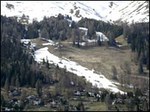News
Fertilizer use causes long-term disruption to alpine eco-systems
Sep 21, 2006
/
alpMedia
A study by the Swiss national research programme on "Landscapes and Habitats of the Alp" supports the assumption that alpine eco-systems do not react particularly flexibly to human intervention.

Image caption:
It takes alpine eco-systems a very long time to re-establish their original balance once they have been disrupted in any way. Priska Ketterer © nfp48
The studies looked at the vegetation and soils on the Schynigen Platte near Grindelwald/CH. In the 1930s the botanist Werner Lüdi conducted a number of experiments in the area using fertilizers and lime treatment to increase productivity in high-altitude pastures. It now appears that these measures were enough to perturb the chemical and microbial soil properties and the diversity of vegetation species over several treatment-free decades.
The areas treated with lime differ significantly from those that were fertilized without it. The differences are due to the fact that the fertilizer is leached out more quickly. By contrast the calcium content and pH value of the areas treated with lime remain higher to this day, promoting the growth of plants that require nutrients. These findings are of particular relevance since considerable amounts of fertilizer now enter the natural cycle through air pollution and have an impact on biodiversity.
Bibliography: Spiegelberger, T. et al (2006): Long-term effects of short-term perturbation in a subalpine grassland. In Ecology: Vol. 87, No. 8, pages 1939-1944. Source: www.presseportal.ch/de/story.htx?nr=100515903 (de/fr)
The areas treated with lime differ significantly from those that were fertilized without it. The differences are due to the fact that the fertilizer is leached out more quickly. By contrast the calcium content and pH value of the areas treated with lime remain higher to this day, promoting the growth of plants that require nutrients. These findings are of particular relevance since considerable amounts of fertilizer now enter the natural cycle through air pollution and have an impact on biodiversity.
Bibliography: Spiegelberger, T. et al (2006): Long-term effects of short-term perturbation in a subalpine grassland. In Ecology: Vol. 87, No. 8, pages 1939-1944. Source: www.presseportal.ch/de/story.htx?nr=100515903 (de/fr)


